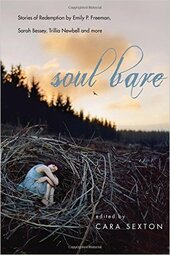One of my consistent struggles with Christianity is that it can feel as though there is no place for those who struggle, for those who doubt. So many Christian books are written from this struggle-free perspective.
I remember being acutely aware of this in the wake of my miscarriage. The books I found by Christians were books written from the other side, after a couple's struggle with miscarriage or infertility had been overcome and the rainbow baby delivered.
Those books weren't helpful for me.
I wanted to read books by people in the midst of struggle, who didn't have the thing they ultimately wanted, and yet who'd still experienced God's goodness... Or if not his goodness, at least his love.
Worship, too, promotes this theology. We sing about being overcomers far more than we sing about suffering.

For these reasons, I was intrigued by Soul Bare, a collection of essays written by a host of recognizable authors including Seth Haines, Sarah Bessey, Jennifer Dukes Lee and edited by Cara Sexton. The premise of this book is that God welcomes your brokenness; that he is there, in the messy places of suffering. As Cara writes in her introduction, “Do you know that your wounds, too, are welcome? Do you know that the soul-bare places, the sights and sounds of your life that you shelter from public display, belong to him? That he resides there? That he redeems there?”
The essays in Soul Bare are broken into three parts: Letting Go, Leaning In, and Hope and Healing. Each of the sections contain essays that reflect, not fully finished and redeemed stories, but raw, vulnerable, in-process stories of God at work.
As a big fan of Sarah Bessey's, I expected to resonate with her essay, Letters of Intention, and did. It is everything you expect from Sarah: Beautiful, honest, and thought-provoking. In it, she wrestles with her call. In her words, “I've never been more convinced of my calling and yet scared to walk it out. I've never been more attuned to the suffering and yet quick to everyday joy. I've never been so easily wounded, and yet I love being armorless.”
The essay I saw myself most in was Sarah Markley's, Without People Like You. In it, she recounts stories from her childhood in which people categorized her as too sensitive. (I may have been called that once or twice, too.) She talks about wanting to grow out of this in order to be more accepted before concluding, at almost 40 years of age, that “Every person who tries to bully that out of me and every word that tries to create a callus over a raw place stands in the face of the God who intentionally created this sensitive heart. And when I try to protect my own heart by building up strong walls of apathy to guard myself, I'm telling God he's done a bad job with me. I'm at my most confident when I own up to who God has made me to be.”
Another of my favorite essays in this collection was Christina Gibson's, Pain and Holy Ground, in which she cautions people: “There is no way we can fully prepare ourselves for pain. You can brace for impact, but you can't stop it from hurting. Preparing for pain is a waste of time. We're far better off embracing difficulty instead of padding against it through cynicism, escapism or control.” This comes in the midst of a raw essay about Christina's daughter's chronic illness, a story that, like so many in this collection, can't be wrapped up in a nice, neat bow and instead ends with Christina concluding, “I don't want to embrace pain, but I do want to embrace God.”
In the final essay of the book, Lost and Found, it's editor, Cara, confesses, “I've found nothing on the shelves to tell a desperate soul what to do when they once were lost and then they became lost again. Nothing I've picked up seems to go beyond the all-cleaned-up-for-church facade that faith is something you put on your calendar, something you do, something that, if only you search hard enough, you can locate.”
In Soul Bare, Cara has given us such a book. Soul Bare isn't a book that tells desperate souls what to do when they become lost, but it is one that will let people know they are not alone; that there's hope when they're lost; and that no matter how messy life gets, they are loved deeply by the God who created them and will never forsake them.
********************************************************
Disclosure: I received a free copy of Soul Bare in exchange for a fair and honest review.